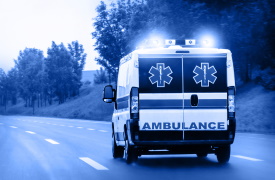Exacerbations: What to Expect When You Call 9-1-1
Posted on June 14, 2022 |
This article was written by Stephanie Williams, BS, RRT.
This article was updated on July 18, 2023.

Have you ever had to call for an ambulance because of a COPD exacerbation? If you haven't had that experience, you may wonder what you can expect if you ever do need to call. I contacted a former colleague of mine, Anthony Turner, RRT, who was an emergency medical technician (EMT) for several years before he became a respiratory therapist. We talked about what to do when you make the phone call, what the paramedics will do when they arrive, and what will happen when you get to the hospital. We hope you never need to call 9-1-1 in an emergency, but if you do, we want to let you know what you can expect.
Q: When someone calls 9-1-1, is it recommended to stay on the line until the ambulance gets there?
A: Generally speaking, yes, the trained medical dispatcher will request that the caller remain on the line for several reasons. The dispatch operator will want updates on how the patient is doing and can give further directions if needed. They can be available to advise and reassure the patient on the status of the ambulance and help the person feel they are not alone. If there are other people with you who can make sure outside doors are unlocked and the pathway is clear, that is helpful, too.
Q: If someone calls with difficulty breathing, or a COPD exacerbation (flare-up), what can they expect to happen when EMTs arrive?
A: Treatment can vary somewhat, however; the patient can generally expect the emergency medical services (EMS) crew to complete a quick assessment, The EMS crew will then give support to the patient. This support can include oxygen therapy if needed, an IV, and place them on a heart monitor. The EMTs can also give medicines like bronchodilators with a nebulizer or sometimes even continuous positive airway pressure (CPAP) therapy. Occasionally medications may be given to reduce patient anxiety, which is common with severe COPD exacerbations. In very rare instances, the EMS crew may sedate and intubate the patient, which helps to stabilize the patient and takes the stress off the patient by taking over their work of breathing and reducing their shortness of breath.
Q: I know that often people are not able to talk, or maybe they are working hard to breathe, making it hard to communicate with EMS, especially if they are alone. But if someone is home with them, what information should they share with paramedics?
A: EMS crews are trained to question those “on scene” for relevant information. Recent and past medical history, a medication list, and demographic information are all needed. Often those on scene are offended at what can seem to be blunt and rapid questioning but it is necessary for timely treatment. The EMTs are not trying to be abrupt or short with the family, they just need to get answers as quickly as possible, so treatment isn't delayed.
Q: Does the person have a say in which hospital they are taken to?
A: Yes and no. To my knowledge, the state regulations continue to maintain a "closest appropriate facility" status which means the ambulance will take you to the hospital nearest your location when you call for help. A true COPD exacerbation will nearly always require transport to the nearest emergency room. In my experience, the patient with difficulty breathing will not object.
Q: Once I get to the hospital, what happens next?
A: Once you get to the emergency room, you can expect a complete nursing assessment, oxygen, CPAP, or bi-level therapy if needed, a chest x-ray, blood tests such as an arterial blood gas, and other lab work, more nebulized bronchodilator therapy, and a visit from the emergency room health care provider. At that time, various medications or therapies may be ordered by the physician as needed to treat the exacerbation.
Q: Is there something you want people to know about calling 9-1-1 for a COPD exacerbation?
A: Often the individual with COPD waits until the exacerbation has worsened and then it can be difficult to manage. If more specialized treatment is needed, the patient may need to be transferred from small community hospitals to facilities with pulmonology services. Many times, this could have been avoided if the flare-up was treated right away at home.
What other questions do you have about exacerbations or what to expect during an emergency? Have you ever had to call 9-1-1 for a COPD exacerbation for yourself or a loved one?